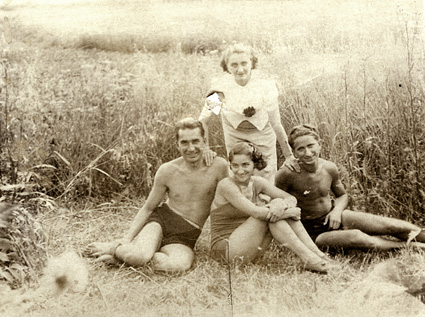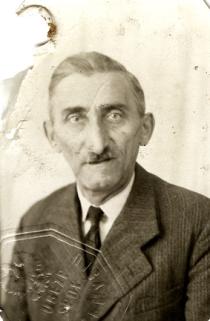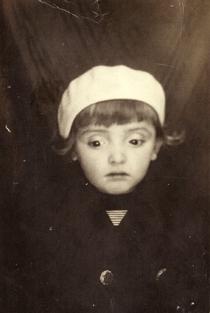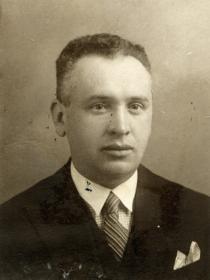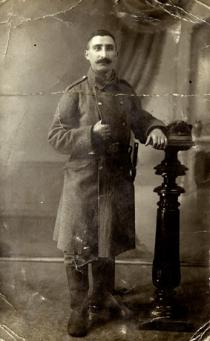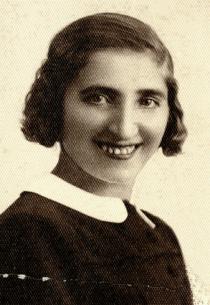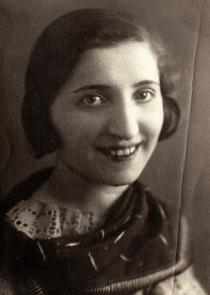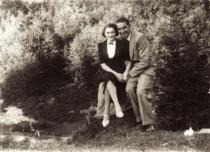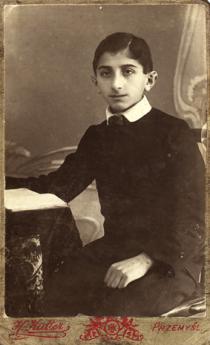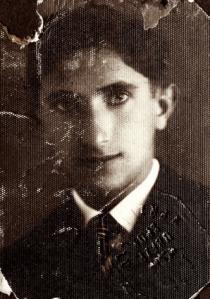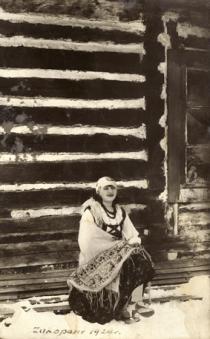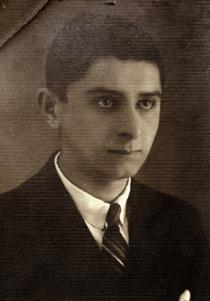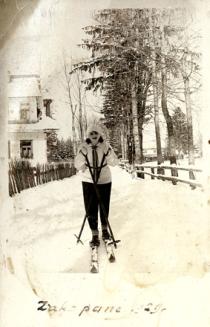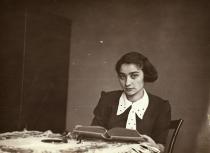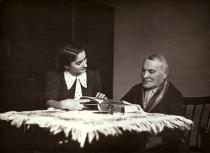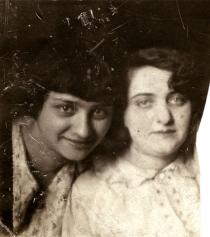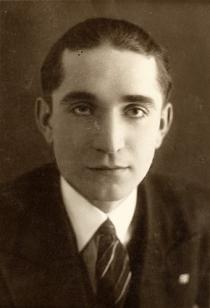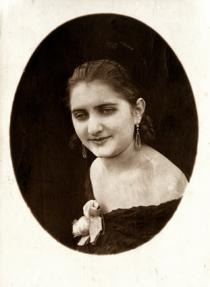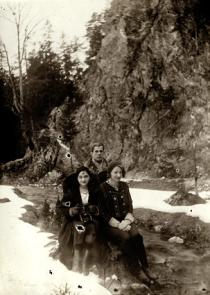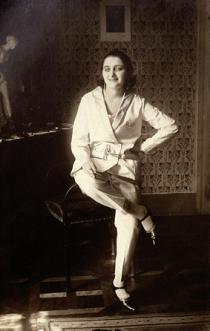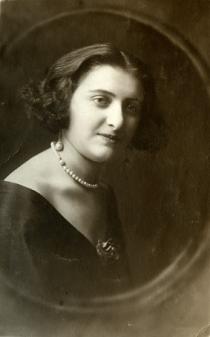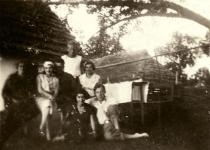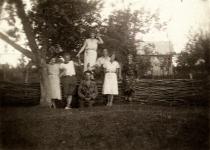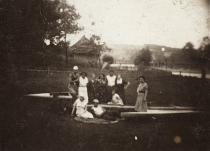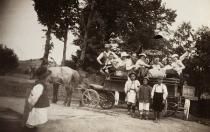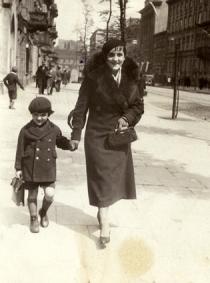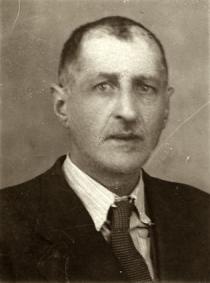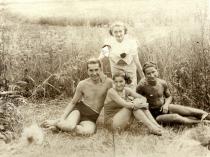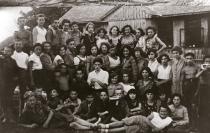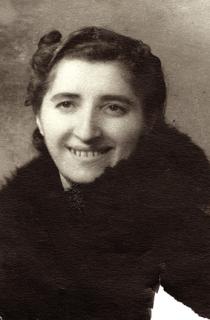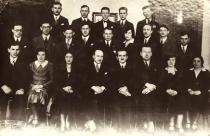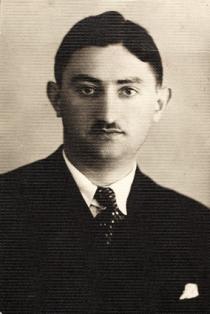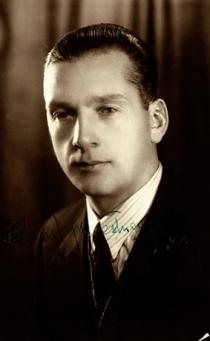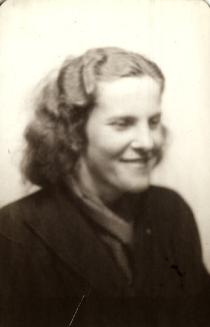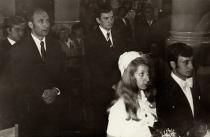This is the photo of me and my sisters: Genia and Minka. The man first from left is Gienia’s husband Tadzik, Tadeusz Bilan. The photo was taken in the 1930’s in village called Bachow.
We were four brothers and four sisters A typical Jewish, large, numerous family. Exactly as God told: 'Procreate and give birth.' We kept very close together. These memories of those young family years are still alive in me. Maybe it's my weakness.
Gienia, Eugenia was a very nice, beautiful girl. She was always regarded as very attractive. Tadzio Bilan's wife, right. His family used to live on Zasanie. They were non-Jews. But it was a healthy, beautiful family. Athletic, all boys were football players. And my brother-in-law was a good football player too, he used to play for good clubs. And what is characteristic, they had very Aryan opinions. National ones.
And it's her my sister correspondence with her husband from the pre-war times that I've got. It used to arrive to our home address until 1939. At 3 Slowackiego Street. My entire knowledge, wisdom, traces from the back-then world, all that came to me thanks to my brother-in-law's brother. One day after the war, when I was already working on the western territories, Leszek, brother of my brother-in-law Tadeusz Bilan, probably brought this treasure of mine to me. Their family also tragically died. Genia spent the entire occupation in Poland. She went through both occupations. She probably wasn't in the ghetto. Genia died in Cracow in 1945. In June or July, something like that.
There was one more sister, Minka, Mina. Born in 1912 or 1913. Minka was a nurse. She died probably in 1940, something like that.
I have very pleasant memories of the school. I had a lot of friends, but I was close mainly with Jewish children. I had nothing against was not biased against Ukrainians, Poles. Absolutely not. Kids always jerk and hit one another but nobody ever told me: 'You Jew'.
As a child I used to go to summer camp. Those were summer camps for poorer Jewish children, so called 'two-pennies'. Jewish social organizations took care of it. In the town we'd get onto the rack carts, padded with straw, and they took us 40, 50km away to particular villages. Those were not summer camps with some propaganda. We just simply knew we were a group of Jewish children that went to recover their health. There was healthy food and games of various kinds there. Such children's games.
I had many weaknesses in my life. Since early childhood I wanted to ride a bicycle. But it was a pipe dream. I was not in such an environment where a kid would have a bike. But I liked to ride. Rebbe's son, Mr. Rispler, had a bicycle workshop vis-a-vis our apartment. At the same time there was a bike rental place and people used to come, pay per hour and rent. So I used to go there, to that shop, I would clean up those bicycles, and later Mr. Rispler in return would loan me a bike, and I would ride it. It was my whim.
Beside that I had another fondness. I wanted to learn to swim, so I would go
several kilometers out of town, and over there, on the San River, I would pick up some reed, tie it with a belt to fasten it firmly. I would put it on the water, there was a strong current, and I'd let myself downstream. Later I swam up to the town, to Przemysl. That's how I learned to swim. It doesn't mean I was a master swimmer. But, at any rate, I was not chicken-hearted, and so I learned. Over there [on San] my friends had boats and a canoe rental place, and I was also eager for that. Whenever I had some time, I would learn to paddle a canoe on San. I was probably 14 years old then. San was my favorite place, where I would find an outlet for my energy.
I was brought up in a Hashomer Hatzair environment. It was a Jewish youth organization. They taught us orienteering. A type of scouting. Beautiful young people belonged to it, very progressive, very noble people, the most gifted, the most honest people. I grew up in there.
